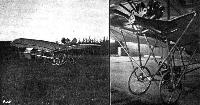P.Lewis British Aircraft 1809-1914 (Putnam)
Portway Monoplane
The single-seat Portway Monoplane was of modified Demoiselle type, and was built during the first half of 1910 by A. P. Portway and his brother of Bromley, Kent. The main structure was of bamboo with silk covering, and the engine was the four-cylinder 35 h.p. Lascelles. H succeeded in making short flights, but was constantly undergoing repairs to its inadequate landing-gear. Span, 25 ft. Wing area, I 50 sq. ft. Weight empty, 350 lb.
Показать полностью
M.Goodall, A.Tagg British Aircraft before the Great War (Schiffer)
Deleted by request of (c)Schiffer Publishing
PORTWAY monoplane (A.P. Portway & Portway, Bromley, Kent)
A modified form of the Santos Dumont Demoiselle was made by the Portway brothers in early 1910. It was flown at West Wickham, although flying was limited by the nature of the ground and damage to the wheels. The fuselage was made of bamboo with cast aluminum sockets at the joints.
Power: 35hp Lascelles four-cylinder air-cooled fantype semi-radial driving a 7ft diameter propeller
Data
Span 25ft
Area 150 sq. ft
Chord 6ft 6in
Weight 350 lb.
Показать полностью
Журнал Flight
Flight, July 16, 1910
THE PORTWAY AEROPLANE.
THE accompanying illustrations show a home-made aeroplane of the Santos Dumont type, that has been constructed during the last three months, at Bromley, in Kent, by Mr. A. P. Portway and his brother. The machine is described as follows by its designer :-
The machine is a monoplane of a modified Santos Dumont type, but larger, the spread of the wings being 25 ft., and length of chord 6 ft. 6 ins. The wings start at a slight dihedral angle, and then become horizontal at about a third of their length from the centre; they are double surfaced and covered in proofed silk.
The body is almost entirely of bamboo joined up with special cast sockets of aluminium, which makes a job remarkable for its strength, lightness and neatness. The tail-elevator is of the usual Santos Dumont, cruciform, non-lifting type. As will be seen in the second photo, we have replaced the original wheels by a pair having broad tyres, and the wheel-skid combination suspension has beenadopted.
The control is by an inclined steering wheel, universally jointed at its base. Rotating the wheel moves the elevator, while a lateral horizontal movement works the rudder. Warping is effected by a vertical lever behind the pilot, which is operated by his shoulders.
The engine is a 4-cylinder 35-h.p. Lascelles, driving a 7 ft. propeller at 1,200 revolutions. The petrol is pressure-fed from a torpedo tank behind the pilot. The total weight of the machine complete is 350 lbs., and the surface 150 sq. ft. The angle of incidence is 8°.
The first trials were most successful, the machine showing a high, speed and getting off the ground; but trouble with the tyres, and finally with buckled wheels, necessitated delay in repairs.
Показать полностью



